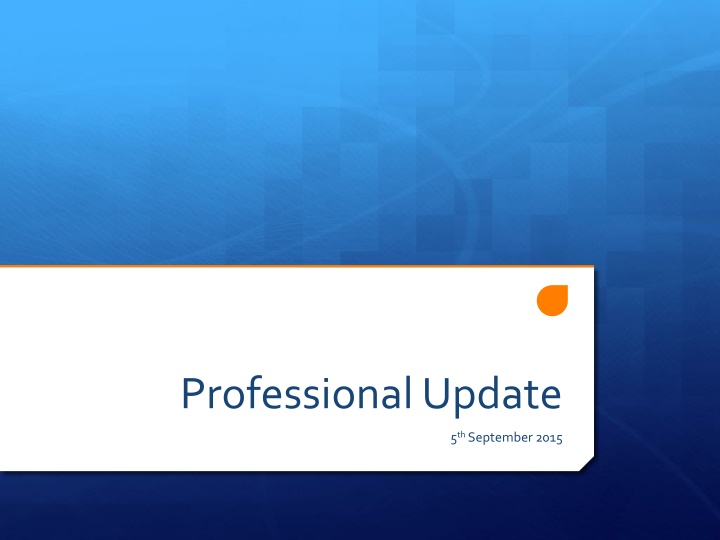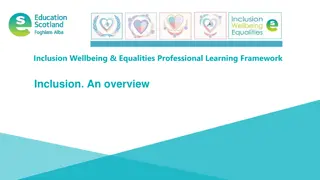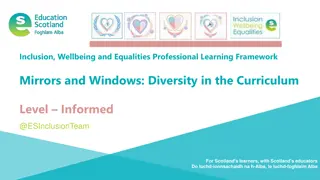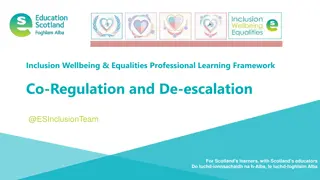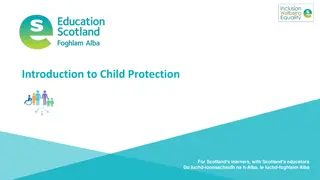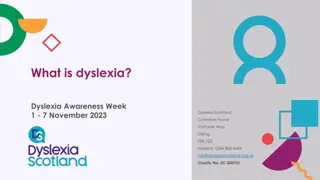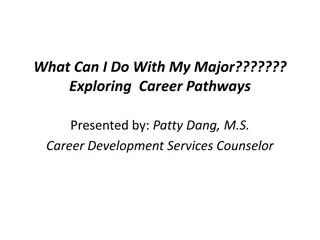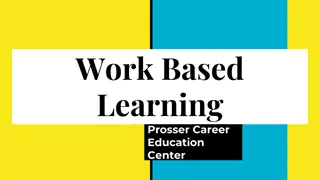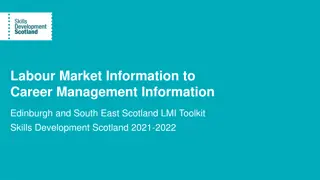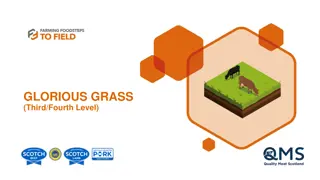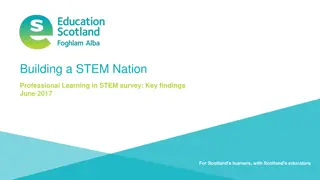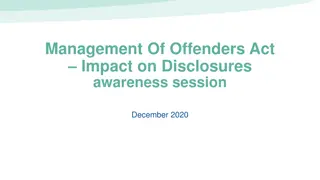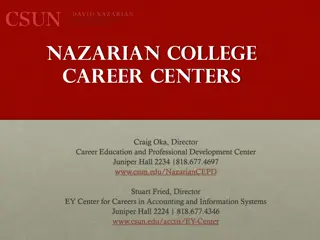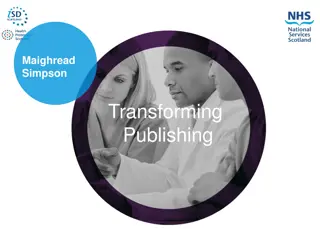Professional Update and Career-Long Professional Learning in Scotland
Scotland's education system emphasizes career-long professional learning for teachers through the Professional Update process, focusing on enhancing teaching standards, supporting professional development, and ensuring ongoing professionalism. The General Teaching Council for Scotland (GTCS) oversees this initiative, which includes measures for self-evaluation, professional review, and continuous learning to maintain and improve the quality of teachers and their impact on student learning. The scheme aims to empower teachers to take responsibility for their development, embrace change, and meet the evolving needs of children and young people.
Download Presentation

Please find below an Image/Link to download the presentation.
The content on the website is provided AS IS for your information and personal use only. It may not be sold, licensed, or shared on other websites without obtaining consent from the author.If you encounter any issues during the download, it is possible that the publisher has removed the file from their server.
You are allowed to download the files provided on this website for personal or commercial use, subject to the condition that they are used lawfully. All files are the property of their respective owners.
The content on the website is provided AS IS for your information and personal use only. It may not be sold, licensed, or shared on other websites without obtaining consent from the author.
E N D
Presentation Transcript
Professional Update 5thSeptember 2015
Education Scotland Website Career-long professional learning builds on current strengths of CPD and extends the concept of the enhanced professional. It sees teachers as professionals taking responsibility for their own learning and development, exercising increasing professional autonomy enabling them to embrace change and better meet the needs of children and young people.
GTCS Background On 17 March 2011, the Scottish Parliament approved the Public Services Reform (General Teaching Council for Scotland) Order 2011 which set out the Government s plans for the granting of independent status to GTC Scotland from April 2012. As part of this legislation (Article 31), the Government placed the GTC Scotland under a duty to introduce a scheme setting out measures to be undertaken for the purposes of allowing it to keep itself informed about the standards of education and training of registered teachers .
GTCS Background GTC Scotland has adopted the title Professional Update for this process. GTC Scotland believes that Professional Update, which is premised on supportive and rigorous professional review and development and sustained professional learning, will contribute to the future quality of the education profession. Engagement in the Professional Update process is a requirement of registration for fully registered teachers from August 2014.
GTCS Key Purposes of PU for teachers are: To maintain and improve the quality of our teachers as outlined in the relevant Professional Standards and to enhance the impact that they have on pupils learning. To support, maintain and enhance teachers continued professionalism and the reputation of the teaching profession in Scotland.
GTCS Key Principles of PU for teachers are: A responsibility to consider their development needs. An entitlement to a system of supportive professional review and development (PRD) which can: assist them to identify constructive ways to engage in self- evaluation and professional learning in order to maintain and enhance professional knowledge, skills and practice;
GTCS Key Principles of PU for teachers are: provide access to professional learning experiences which can develop and enhance professional practice as well as addressing those areas identified as requiring support; help them manage change; and offer a focus on ways in which they can enhance their careers. Confirmation that they have maintained the high standards required of a teacher in Scotland s educational establishments.
GTCS Features of Professional Update An annual update of contact information this can be done through MyGTCS account A career-long commitment to, and engagement in, professional learning, including continuing engagement in PRD - It is important that professional learning provides rich opportunities for teachers to develop and enhance their professional knowledge and practice, in order to progress the quality of learning and teaching and school improvement.
GTCS Features of Professional Update The PRD process should be built on a personal review by the teacher. It should help to identify the professional learning needs of each teacher, the steps they intend taking to meet those needs and the support they might reasonably expect to help them do so. The concept of an entitlement to support should be balanced by each individual s responsibility to seek opportunities for development. However, this process should be delivered in a manner which is not unduly bureaucratic.
GTCS Features of Professional Update Opportunities for all teachers to engage in ongoing self- evaluation against appropriate GTCS Professional Standards - It should be noted that the Standard for Full Registration continues to be the baseline Professional Standard for competence for the teaching profession in Scotland. Maintenance of a reflective record of professional learning and associated evidence of impact on thinking and professional actions, discussed with a line manager as part of the PRD process - teachers will not be asked to provide retrospective evidence of engagement in professional learning and the PRD process prior to August 2014.
GTCS Features of Professional Update 5 Yearly confirmation of engagement in the Professional Update process with GTC Scotland Professional Update Sign off. The system of recording that teachers will use to record their professional learning will vary depending on where they are currently employed -GTC Scotland has developed an on-line professional learning record which can be accessed through MyGTCS. Where a local authority or other employer has an existing system in place, there will be no requirement for a teacher to duplicate information on the MyGTCSon-line profile. Where an existing system is in place, arrangements will be made for the Professional Update sign-off information to be transferred to GTC Scotland.
GTCS Using the Professional Standards For teachers who have achieved the Standard for Full Registration, GTC Scotland has developed Standards which offer constructive support for teachers as they consider how they might develop their professional knowledge, skills and actions through engagement with on-going self-evaluation and professional learning. The Standard for Career-Long Professional Learning has been developed to support teachers choosing to reflect on this Standard as part of their professional learning, whilst the Standards for Leadership and Management have been developed to support the self- evaluation and professional learning of those in, or aspiring to, formal leadership roles in schools.
GTCS Using the Professional Standards Whilst the revised standards have been designed to meet the needs of teachers at all career stages working in Scotland s schools, aspects of these may not be directly relevant to teachers working outwith the school system e.g. centrally based local authority staff, teachers working in universities or national organisations. Therefore, in addition to the revised suite of Professional Standards and the related support materials, GTC Scotland will develop further guidance notes and support materials for teachers working outwith the school system.
A Model for Professional Learning This model places the practitioner at the centre where the focus is on self-directed learning. Education Scotland
Education Scotland A Model for Professional Learning Reflection on practice: asking questions, being curious and looking closely at practice developing skills in observing what is happening developing skills in analysingand evaluating what is happening exploring roles and approaches in professional practice.
Education Scotland A Model for Professional Learning Experiential learning: trying out and exploring the impact of approaches experimenting and taking risks with innovative practice examining outcomes and identifying learning from innovative practice building new ideas into practice in structured ways.
Education Scotland A Model for Professional Learning Cognitive development: being open to and seeking new ideas and practices questioning assumptions about practice using different sources to critically examine experience and practice testing ideas and exploring the implications for practice.
Education Scotland A Model for Professional Learning Collaborative learning: working collaboratively to support each other in changing practice sharing ideas and experiences through professional dialogue seeking constructive feedback on practice and the impact on pupil learning providing constructive feedback on practice and the impact on pupil learning.
GTCS Impact and Evidence of PL Impact on: you, your thinking & practice your colleagues, your learners, the system, etc Evidence should be: drawn from range of sources relevant & meaningful analysedand reflected on key messages shared as part of professional dialogue Evidence helps to make explicit the processes of thinking and learning about practice
GTCS Examples of Professional Learning Self-evaluation and critical reflection processes Experiential, action or enquiry-based learning Professional dialogue with colleagues, other professionals, parents, and learners Focused professional reading and research Leading or engaging in practitioner enquiry/action research Critical analysis of reading, learning and impact on professional practice
GTCS Examples of Professional Learning Classroom visits/peer observation online learning/blogs Work shadowing Co-operative or team teaching Participation in collaborative activity e.g. teacher learning community, learning round Leading or participating in a working or task group Planning learning which is inter-disciplinary or cross-sector
GTCS Examples of Professional Learning Participation in activities relating to assessment and moderation Secondments, acting posts and placements Masters study and qualifications Accredited courses or activity related to achieving national professional standards for teachers Professional/ Academic conferences Learning about aspects of the curriculum or pedagogical practice Peer support e.g. coaching or mentoring
S. Youd Collaborative Enquiry Carolyn S. Wallace Aileen Kennedy formerly Stirling University Strathclyde University
Collaborative Enquiry Groups: Within this model, teachers form small groups based upon similar interests Everyone is equal You have autonomy in your learning
Benefits Teachers learning from each other. Development of a sense of ownership of practice. Evidence that collaboration leads to lasting impact on schools.
Collaborative Enquiry involves: Self-regulated, individual cognition, including reflection (autonomy) Situated, collaborative learning (communities of practice) Transformative change in practice, impact
The Standards The Standards for Registration -2.1.2, 2.2.2, 2.3.2, 3.1.2, 3.1.5, 3.4.2 The Standard for Career-Long Professional Learning - 1. Professional Commitment 2. Professional Knowledge and Understanding 3. Professional Actions
Collaborative Enquiry Example ideas: Equality in education (e.g. Equality Act 2010 or Education (Additional Support for Learning) (Scotland) Act 2004 Learning Theories -how we learn/theorists Communication -theory and practice (including listening and questioning techniques) Education systems in other countries Learner engagement and enjoyment
Collaborative Enquiry Example ideas: Assessment strategies Political influences in education (policy) Social and economic influences on learners and learning GTCS Standards, PRD and PU -effects and change Digital technologies and how they affect learning
Locating Reading Material/ Research MyGTCS Google Scholar Research EBSCO database And Education Hub
